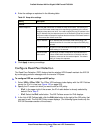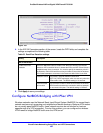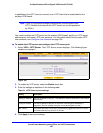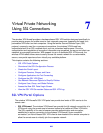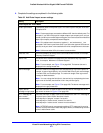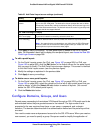
266
7
7. Virtual Private Networking
Using SSL Connections
The wireless VPN firewall provides a hardware-based SSL VPN solution designed specifically to
provide remote access for mobile users to their corporate resources, bypassing the need for a
preinstalled VPN client on their computers. Using the familiar Secure Sockets Layer (SSL)
protocol, commonly used for e-commerce transactions, the wireless VPN firewall can
authenticate itself to an SSL-enabled client, such as a standard web browser. Once the
authentication and negotiation of encryption information are completed, the server and client can
establish an encrypted connection. With support for up to 5 dedicated SSL VPN tunnels, the
wireless VPN firewall allows users to easily access the remote network for a customizable,
secure, user portal experience from virtually any available platform.
This chapter contains the following sections:
• SSL VPN Portal Options
• Overview of the SSL Configuration Process
• Create the Portal Layout
• Configure Domains, Groups, and Users
• Configure Applications for Port Forwarding
• Configure the SSL VPN Client
• Use Network Resource Objects to Simplify Policies
• Configure User, Group, and Global Policies
• Access the New SSL Portal Login Screen
• View the SSL VPN Connection Status and SSL VPN Log
SSL VPN Portal Options
The wireless VPN firewall’s SSL VPN portal can provide two levels of SSL service to the
remote user:
• SSL VPN tunnel. Th
e wireless VPN firewall can provide the full network connectivity of a
VPN tunnel using the remote user’s browser instead of a traditional IPSec VPN client.
The SSL capability of the user’s browser provides authentication and encryption,
establishing a secure connection to the wireless VPN firewall. Upon successful
connection, an ActiveX-based SSL VPN client is downloaded to the remote computer to
allow the remote user to virtually join the corporate network.






